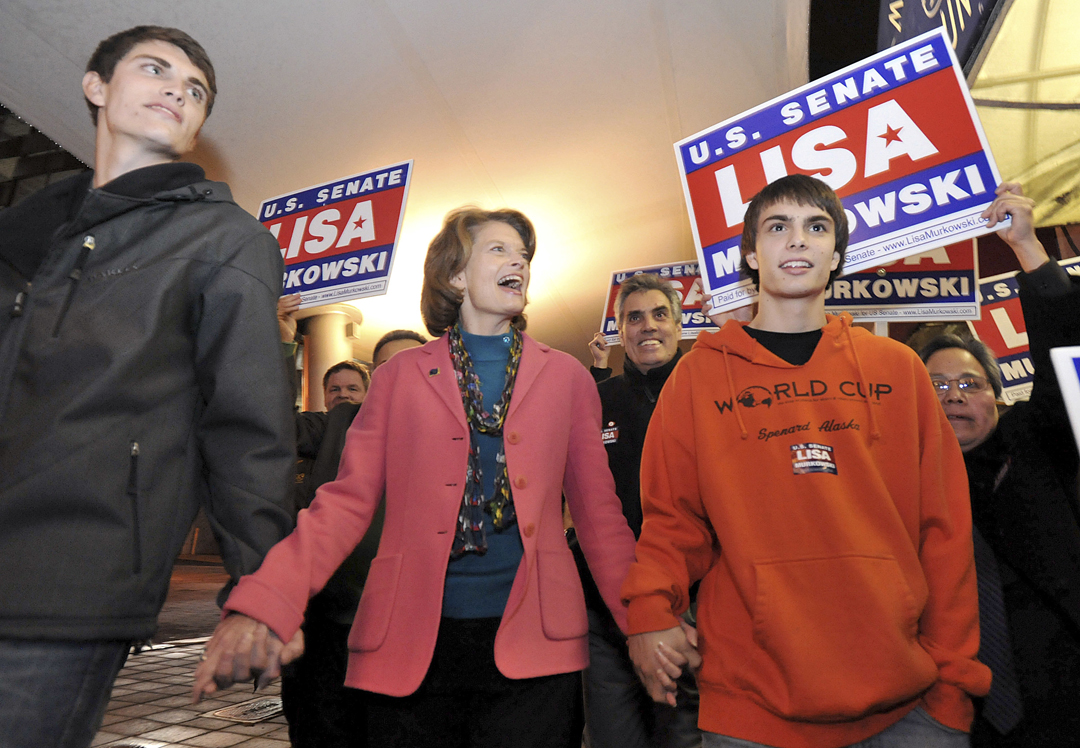JUNEAU — It’s an election night tradition in Alaska: jubilant candidates followed by chanting, sign-waving supporters parade into a cavernous convention hall, shaking hands and taking their turn at the makeshift TV sets dotting what is known as “Election Central.” Republicans mill about with Democrats as race results are projected onto a bare wall by state election workers. Campaign staff line up interviews for their candidates as they cycle in and out of the room.
But this longstanding event — an outlier during a divisive U.S. presidential election and in polarized political times that show little agreement between the two major parties — is set to end, a casualty of a multibillion-dollar state budget deficit fueled by chronically low oil prices. State election officials, looking for places to cut back, have said they will not be renting the state’s largest convention center in Anchorage for primary and general election watch parties this year, citing the $25,000 rental costs and questioning the state’s continued role in the event at a time when results can now be easily accessed online.
“With the internet, our presence has kind of become obsolete for the most part, reporting those returns,” state elections director Josie Bahnke said. The $25,000 doesn’t include costs like airfare or hotels for election staff who come to Anchorage to do tabulations at Election Central, she said.
In many states, political parties or candidates host their own election night soirees. They do that, too, in Alaska. But while Election Central tends to have a high-energy vibe, it’s more a media event than a campaign rally.
John Tracy, a retired journalist who co-owns an Anchorage advertising firm, called it “one-stop shopping” — a convenient place for reporters to catch candidates for a quick interview and for candidates to get on TV to thank their supporters.
The state first got involved with Election Central in Anchorage in the mid-1990s, joining an effort earlier begun by the news media and taking the lead on it, Bahnke said. Starting in at least 2002, the Division of Elections also hosted Election Central events in Juneau and Fairbanks, she said. Events there were discontinued in 2012 due to low turnout, she said.
Tracy, who also does some consulting work, said he doesn’t think that news organizations will be too worried about not having a central gathering spot for the August primary. While there are some closely watched legislative races, the incumbents in the top-tier races — U.S. Senate and House — face no major challenges. The general election, where those races are expected to heat up, could be a bit trickier to cover, he said.
It’s possible that news organizations at some point might want to pool together to rent space, he said.
Robert Dillon, a spokesman for Republican U.S. Sen. Lisa Murkowski, said the campaign is planning an event in a central Anchorage location for supporters, volunteers and staff. Reporters will be welcome to come by once results are in, he said.
Tracy remembers the old days, when the Division of Elections would hand-write results on a projector screen at Election Central. For many years, that’s where reporters got the numbers, he said. Now, results are posted online and regularly updated.
Tracy also remembers when it seemed like the entire city of Anchorage would turn out for Election Central. That seems to have fallen off, though, he said, guessing it has to do with the quicker reporting of results.
Election Central has been a benefit to everyone, Tracy said. But he understands the state not spending money on it, given its financial challenges.
So does Anchorage Democratic Rep. Les Gara.
After his first election, Gara said it felt great walking into Election Central with his wife. But in a time of a budget deficit, Gara said, “you don’t really have the money to make people feel good. That’s a luxury.”
—
Read more news:
Whale-watching boat sinks near Juneau, 18 rescued
On the Juneau tennis court, saving a life is no racket
Mary Becker to seek third Assembly term

